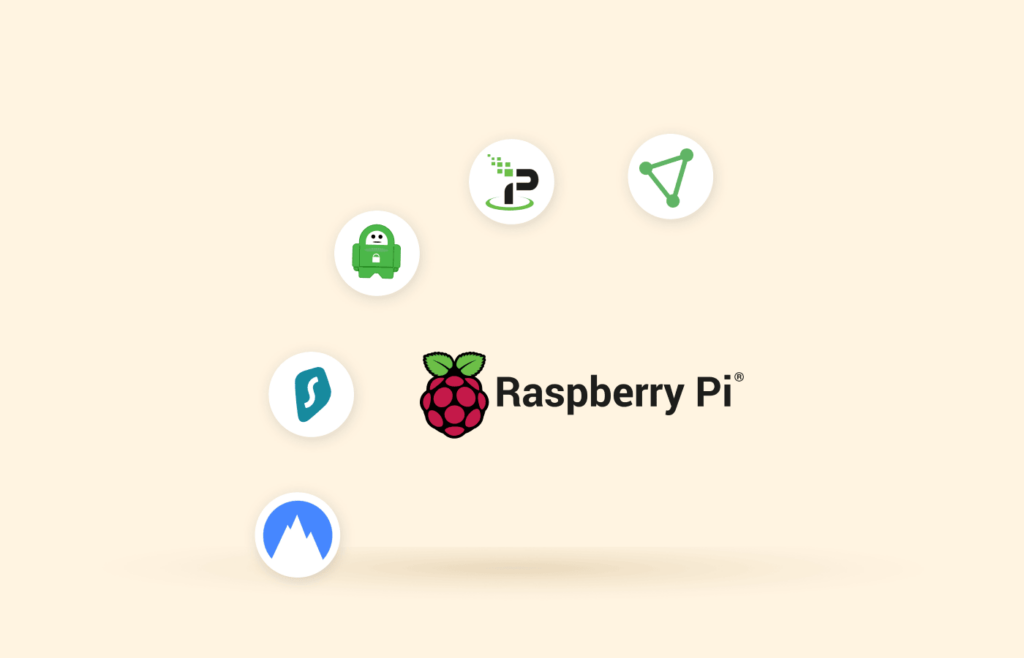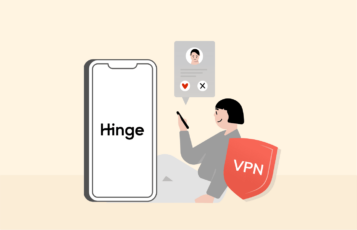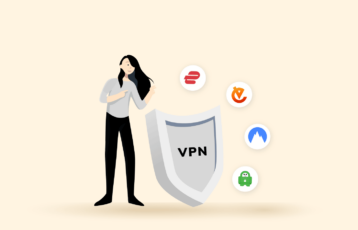Raspberry Pi is an inexpensive single-board computer slightly bigger than a credit card. It can do anything conventional computers can, like surfing the internet, playing games, coding, making spreadsheets, etc. These devices were developed to promote basic computer science, but they have become popular outside the classrooms. Hobbyists use them in various ways, such as robotics, home automation, and emulator projects.
Unfortunately, RasPi OS doesn’t offer significant security features to the users. So, hackers or any other cyber attacker can easily access this sensitive information if not protected. Therefore, using a VPN for Raspberry Pi is a must to encrypt the data in transit.
In this guide, we have gathered the top 5 best VPNs for Raspberry that you can use. Also, you’ll learn why you need a VPN on Raspberry Pi and much more.
Quick list of the top Raspberry Pi VPNs
Are you short on time? Then, check out this summary of the best VPNs for Raspberry VPNs on the market.
- NordVPN – This is our number-one choice for Raspberry Pi. It is an excellent service, despite the low-priced packages. The Linux client lacks the graphical user interface (GUI) but is very easy to use once you install it. In addition, most of the servers provide phenomenal speeds to stream high-quality videos and download torrents unrestricted.
- Private Internet Access – This is the only provider on this list whose Linux client has a GUI, making it easy to install the VPN. Also, it has the most extensive server network, and the packages are reasonably priced.
- Proton VPN – It is a premium VPN service that offers a free version. Even though the free plan has limited features, it is better than VPNs that provide completely free services. Fortunately, you can access the rest of the features if you upgrade to paid subscriptions.
- Surfshark – Another budget-conscious VPN for Raspberry Pi. However, the Linux app doesn’t have a GUI but is effortless. Besides supporting Linux, the VPN offers native apps for platforms like Windows, macOS, Android, and iOS. Fortunately, you can connect as many devices as you like.
- IPVanish – A trustworthy VPN for Raspberry Pi. It has a modest server network and uses advanced features to maintain your security. Unfortunately, it is based in the US, which is unsuitable for privacy. However, the provider follows a strict no-logs policy, so your information remains anonymous.
How to use a VPN with Raspberry Pi?
- Choose a trustworthy VPN service that supports Raspberry Pi or Linux. Our top recommendation is NordVPN.
- Select your preferred package and subscribe. Most VPN providers, including NordVPN, offer multiple plans to cater to different budget points. Usually, longer subscriptions have better discounts.
- Download and install the VPN software using the terminal.
- Launch the VPN and connect using the terminal.
Is a VPN for Raspberry necessary?

Raspberry Pi OS does not offer sufficient security on the Pi device, especially in encrypting the internet traffic. So, you might need to secure your device, especially when using it online.
But why is it important to encrypt the data routing through the Pi device? We hear you ask.
Usually, Raspberry Pi is used in security and surveillance systems. It acts as the web gateway to route data from devices like surveillance cameras to your phone.
Unfortunately, nothing will prevent a malicious actor from accessing the data if the channel is unencrypted, which can compromise your home security. This is just one example of the threats you face when you access the internet without any form of encryption.
The best VPNs for Raspberry – The detailed list
After thorough research and testing, we present you with the best Raspberry Pi VPNs. These five options below have proven to offer solid performance and protection.
1. NordVPN

Our number 1 choice for Raspberry Pi users as it offers a dedicated VPN client for the device. Plus, its resilient security features and top-notch performance make it a must-have for all.
Pros
- Offers a Raspberry Pi-Linux app
- Reliable support
- Great privacy and security
Cons
- The Linux app doesn’t have GUI
NordVPN is a secure and well-established VPN service for Raspberry Pi. It has a long-standing reputation for providing the utmost privacy, security, and data protection.
The VPN has more than 6,800 high-quality servers in over 110 countries. Because of its impressive unblocking capabilities, you can unblock content and gaming apps globally. In addition, it offers unlimited data so you can stream HD movies and TV shows on streaming sites like Netflix.
Accessing the internet without sufficient protection can be risky. NordVPN will secure your web connections with military-grade AES 256-bit encryption, blocking third parties from accessing your traffic. Besides, it also uses an automatic kill switch to prevent your data from leaking from the encrypted tunnel.
The privacy policy is an excellent way to determine a company’s stand on users’ privacy. Thankfully, NordVPN’s policy clearly states that the provider doesn’t retain identifiable information, assuring ultimate online privacy. Also, it is based in Panama, which is a privacy-friendly region.
There are two main ways you can install NordVPN on your Raspberry; either through the Linux App or by downloading and installing the Debian package. The VPN is compatible with other platforms like Windows, macOS, Android, and iOS. Furthermore, it allows you to connect up to 10 devices on a single subscription.
NordVPN delivers blazing-fast speed and will handle virtually any task. So, you can stream quality content and play data-intensive games like Fortnite and Minecraft.
All the plans are reasonably priced and have a 30-day money-back guarantee. Fortunately, it has a help center with many resources and around-the-clock support via 24/7 support chat, email, and phone support.
2. Private Internet Access (PIA)

An impressive Linux VPN for Raspberry Pi users to protect their devices Its huge server network ensures you remain secure and evade VPN bans during intensive online activities.
Pros
- The Linux app has GUI
- Excellent privacy and security
- Massive server network
Cons
- No live chat support
Private Internet Access (PIA) popularity has grown tremendously, perhaps due to its vast network of more than 36,000 servers in 91 countries. Also, it is packed with useful features you can use on your Raspberry Pi.
The VPN allows you to choose the security level with either AES 128 or AES 256-bit encryption. In addition, it offers SHA1/SHA2 hashing algorithms for authentication alongside RSA-4096 and ECC-521 handshake methods. This combination ensures that no one can intercept your traffic to snoop on your activities or steal your data.
PIA is an excellent choice if you want to unblock streaming platforms on Raspberry Pi. It unblocks geo-blocked content on streaming services such as Hulu, Peacock TV, ESPN, HBO, etc. Unfortunately, it doesn’t bypass the restrictions of some Netflix libraries, like in Mexico and Germany.
A single subscription allows you to connect unlimited simultaneous connections. In addition, it supports Linux, and setting it up on Raspberry is super easy. Besides, you can also configure the VPN with Android, Windows, iOS, and macOS.
An extensive server network is desirable for speed because there will be less crowding. Moreover, PIA offers unlimited bandwidth and data. So, these two factors will ensure you stream and download torrents smoothly without any hitches.
3. Proton VPN

A premium VPN with a free version. It’s a great option for Raspberry Pi users as it supports the device seamlessly with a dedicated Linux VPN client.
Pros
- Offers a free version
- Watertight security
- Solid privacy
Cons
- No live chat support
Proton VPN is the best freemium VPN for Raspberry Pi. Freemium means that it offers a free version and very affordable paid packages. Furthermore, it employs all the necessary measures to ensure maximum privacy and security on the Internet.
The VPN has a decent network of around 9,000+ servers in 112 countries, covering North America, Europe, South America, Asia, and South Africa. Fortunately, the server list has symbols next to the location to indicate their function, like B (Basic), P(Plus), Onion, and P2P. This makes it extremely easy to choose the server you want.
Proton VPN uses advanced security such as AES 256-bit encryption to mask your IP address and safeguard sensitive information. In addition, it fortifies the encryption with AES 256-bit encryption and 4096-bit RSA key exchange. Other security features include DNS leak protection, automatic kill switch, split tunneling, multiple VPN protocols, and NetShield adblocker.
As for privacy, Proton VPN has a no-logs policy and doesn’t keep any crucial information. Also, the provider is based in Switzerland, which isn’t part of the 14 Eye Alliance.
On the downside, Proton VPN lacks a live chat option. However, you can get help from the extensive help center or contact customer support through tickets.
4. Surfshark

Another budget-conscious VPN for Raspberry Pi. It comes with unlimited logins simultaneously, thus protecting your entire network.
Pros
- Dedicated Raspbian app
- Unrestricted device connection
- Reasonably priced packages
Cons
- The app lacks GUI
Surfshark is a budget-friendly option for Raspberry Pi. However, this doesn’t mean that it is an inferior service. Instead, the VPN offers an easy-to-install and use Linux client and other valuable features.
It operates a network of over 3,200 servers in 100 countries, enabling you to evade geographic restrictions and access content from anywhere. In addition, Surfshark servers successfully unblock various streaming services such as BBC iPlayer, Netflix, Hulu, etc. Fortunately, you can stream in Ultra HD as it offers unlimited bandwidth and data.
The company highly values its users’ security. Therefore, it employs adequate measures, such as military-grade AES 256-bit encryption, automatic kill switch, MultiHop (double VPN) servers, and DNS leak protection. In addition, a CleanWeb suite will block intrusive ads, prevent malware infection, and stop trackers.
According to its privacy policy, Surfshark does not keep personal information despite being headquartered in the Netherlands. Moreover, it runs a RAM-based server network where the servers can’t store your data. As a result, your online activities will remain completely private.
The VPN provides a character-based Raspbian app. While it might be challenging to get used to at first, it’s effortless to use when you familiarize yourself with it. Besides, there is an option to configure the VPN on Raspberry Pi through the OpenVPN protocol.
One area where Surfshark trounces its competitors is the unlimited simultaneous connections. Apart from Raspberry Pi, you can connect to other devices like Windows, Android, iOS, macOS, Firestick, PS4, etc.
The provider offers multiple customer support methods if you cannot set up the VPN with Raspberry Pi. For example, you can consult the resource-rich library, use the contact form, or 24/7 live chat.
5. IPVanish

A trustworthy VPN for Raspberry Pi. It offers a user-friendly Linux VPN client that anyone can easily configure on Raspberry Pi. Also supports unlimited simultaneous connections to ensure network security.
Pros
- Strong encryption
- Good customer support
- Doesn’t retain logs
Cons
- Lacks a Linux app
IPVanish is a reliable option for Raspberry, with all the features you may need in a VPN at a great price. In addition, as the name suggests, it will vanish your IP address, which will help maintain your online privacy.
The VPN has a comprehensive global network of over 2,200 servers in 75 locations globally. The regions with high server concentration include the US, the UK, France, Australia, and Canada. Fortunately, you can switch the servers as much as you like. Also, you can choose a server in the location menu, connect from the map, or use filters to narrow down your preference.
Security is one of the crucial factors to consider when choosing a VPN service. Thankfully, IPVanish uses advanced features such as AES 256-bit encryption to secure your connections. In addition, it has an SHA-512 hash function to process your login information, which adds an extra security layer.
Regarding privacy, the provider observes a strict zero-logs policy and does not retain any user data. It means it won’t have any information to hand over if authorities request it. Sadly, it is based in the US, subject to 5/9/14 Eyes Alliance.
Unfortunately, the VPN doesn’t offer a Linux app. However, you can manually configure it with the OpenVPN protocol. Thankfully, the website has easy-to-follow guides to help you through the process.
Buffering and lagging are issues that can be highly annoying, especially when streaming videos or playing games. The good news is that your speed loss will be barely noticeable when you connect to most IPVanish servers.
How we selected the best VPNs for Raspberry Pi OS
VPNs are not the same; some are more competent than others. In this case, we looked for services that offer specific features for smooth operation with Raspberry Pi.
Support for Raspberry Pi or Linux
Of course, the best Raspberry Pi VPN should have a compatible app. The service should have a Pi or Linux client because Raspberry Pi OS is based on the Debian Linux distributor. Besides, it should also support other operating systems such as Windows, Android, macOS, and iOS.
Security and privacy
Web protection is another crucial factor to consider when choosing these VPN services for Raspberry Pi. All the VPNs on this list have adequate security with features such as AES encryption, DNS leak protection, kill switch, etc. In addition, we highly favor VPNs that safeguard against viruses and malware.
Moreover, we selected VPN services that strictly observe a no-logs policy and are based in privacy-friendly jurisdictions like the British Virgin Islands and Panama.
Speed
Unfortunately, a VPN will slow your connection by routing traffic through intermediary servers. However, the VPNs on this list use up-to-date technology and high-quality servers to improve the VPN speed. This is particularly important as streaming or gaming via Raspberry Pi requires fast connections.
Usability
Sadly, the VPNs on this list lack a Linux interface except for Private Internet Access (PIA), but you can do the installation through the terminal. Nonetheless, the process and experience of using it should be smooth.
Customer support
Anything can happen even when using the best VPN service. That is why we compiled VPNs that offer multiple methods to contact support. They provide a 24/7 live chat, phone support, email, and detailed guides.
Can I use a free Raspberry Pi VPN?
When something is offered for free, be careful you might be the product. For example, most free VPNs engage in fraudulent practices like selling users’ data to make money. This means that they don’t care about your privacy.
Furthermore, free VPNs use weak or no encryption, leaving your connection vulnerable to all kinds of threats. Also, they can’t bypass geo-restrictions so that you won’t stream blocked content.
That is why we recommend premium VPN services. Fortunately, most of these providers have free trials and a money-back guarantee you can use if you are on a budget. Alternatively, you can check out these affordable VPNs.
What else can a VPN help with?
Apart from safeguarding you from snooping eyes, a VPN can also help improve your online experience.
First, when you connect to a server, the VPN will make you and your device appear in a different country. This is because it will replace your IP address and assign your device a new shared one. Therefore, you can access geo-blocked content and services in any part of the world with a Raspberry Pi VPN. For example, you can connect to an Australian server in the UK and stream local movies and TV shows.
Free WiFi is available almost everywhere, such as airports, libraries, coffee shops, etc. Unfortunately, these hotspots are unsafe, and hackers can easily intercept your traffic. However, a VPN will encrypt your connection, making it virtually impenetrable. The best part is that the latest Raspberry Pi models have HDMI ports and built-in WiFi capability.
Internet service providers (ISPs) habitually throttle bandwidth if you exceed the set limit. It can be annoying when doing data-intensive activities such as streaming content and playing games. Thankfully, since the VPN encrypts your traffic, your ISP won’t see what you do online.
Is Raspberry secure?
It mainly depends on how you are using Raspberry Pi. Generally, it is secure, providing that you don’t connect to an outside network.
Hardware hacking is usually impossible unless the hacker physically accesses your device. So, the chances of getting hacked are minimal unless you leave your device open.
However, if you connect to an outside network like the internet, the situation changes completely. There are unlimited ways a hacker can hack into your system and do nasty stuff like stealing your personal information or IoT data.
A VPN is the best way to stay safe from these hacking threats. Fortunately, the VPNs on this list support Linux, which is the basis of the Raspberry Pi operating system. Hence, you can install these on your device to secure your online connection.
The process of installing a VPN on Raspberry Pi
Installing a VPN on Raspberry is pretty simple, but the process may differ from one service to another. The guide below illustrates how to install a VPN on your RasPi device:
- Select a reliable VPN service like NordVPN.
- Subscribe to a suitable plan and create an account.
- Download the Linux client. You can download it through the terminal or from the browser.
- Update to the latest RasPi version. There might be a need to reboot your device.
- Login to the VPN through the terminal or the app interface.
- Depending on the provider, configure any settings or enable/disable any features before you connect.
- Connect to your preferred server using the terminal commands.
- Explore the extra features the VPN service provides.
- Your Raspberry Pi is now set and safe to use.
If you cannot configure the VPN with your Raspberry, you can always contact your provider through the available means.
FAQs
Yes, Raspberry is powerful enough to act like a Minecraft server. The latest Pi versions have sufficient memory (RAM/ROM) to host a data-intensive game like Minecraft. Fortunately, you will even have complete control over the server.
Yes, you can make Raspberry Pi as a server on your local network or the internet. Raspberry Pi can become a great server as it consumes minimal power, and you can set it up indefinitely. It will be handy for playing games, browsing the web, and even as an IoT gateway.





